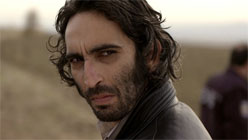The camera lingers on the outside of a window, and the clearest things in focus are smudges on the glass. Vaguely perceptible, inside the room, are the outlines of three men huddled around a table. Eventually, the camera lets us see them eating, laughing and clinking glasses, but we still can’t hear their voices, which are muffled by the outside sounds of traffic, dog barks and other nighttime noises. One of the three men — a man with a bushy mustache who sticks his face directly in the window to see what’s outside — will be hog-tied and buried alive, killed by one or both of the two other men in that room.
Once Upon a Time in Anatolia is a murder mystery — where is the body hidden, and what motivated the perpetrators? — but director Nuri Bilge Ceylan turns the search for answers into a riveting two-and-a-half-hour study of three men on the periphery: the police chief examining the crime; the doctor tagging along to perform the autopsy; and the prosecutor who is there to oversee the investigation, which takes place on a single night in a rural part of Turkey. The drama, which opens a one-week run at the SF Film Society Cinema on Friday, confirms Ceylan’s status as one of Europe’s greatest living directors, an inheritor of a mantle that was carried for years by Michelangelo Antonioni, Ingmar Bergman and Krzysztof Kieslowski.
Dialogue that’s intense without being show-offy. Characters from everyday backgrounds who are confronted with circumstances that are challenging but not Herculean. Scenes that are framed against arresting vistas. These are the trademarks of Ceylan’s films. If Edward Hopper had been a filmmaker, his movies would have been like Ceylan’s, peopled by those who are often alienated from others or from their own emotions. Ceylan has said his characters are like him: A little dark, a little pessimistic, a little self-reflective. “I don’t have very optimistic feelings about life,” Ceylan told an interviewer earlier this year. “I like to look at things realistically, and with that realism comes pessimism.”
What separates Ceylan’s movies, which include Distant (about an urban man who reluctantly takes in a cousin from a village) and Three Monkeys (about a hit-and-run incident that leads to deception and family strife), are their defiant ambiguity: The characters’ motivations are never crystal clear. It’s one reason I love his films; the biggest mystery is piecing together the complexities of his protagonists.


